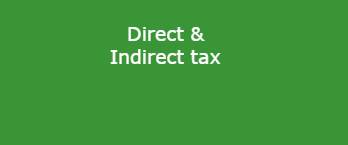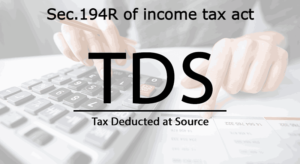Tax is a mandatory charges levied by govt. on an individual or organization in order to collect revenue. Govt collect from eligible person in order to develop nation and provide best services to the citizens.
In order to run nation smoothly govt needs to collect fees or finance charges from eligible person.
What is tax in India??
It is an amount of money that govt. requires people to pay according to their income . And this amount is used by the government for the development of the country like infrastructure facilities. For improving the education system , upliftment of society , welfare activities for nation or for security measures etc.
In other words It is a mandatory fees or charges levied by govt. on an individual or organization in order to collect revenue. Govt collect from eligible person in order to develop nation and provide best services to the citizens.
Further this is an compulsory fees collected by local, state or central govt. Taxes are charged by govt in order to generate income for the projects to boost economy and rises the standard of living of the citizens.
Types of taxes in India
There are mainly two types of taxes in India i.e.
- Direct and
- Indirect
Lets elaborate the types of taxes .

What is direct tax??
It is an amount which is directly paid to the govt by an individual or organization. And include income and property or taxes on assets.
Lets learn what is Income tax in India??
It is is a direct tax. Person shall pay directly to the govt. if their total income exceeds the basic exemption limit. Further basic exemption limit is a slab rate under which individual will pay on their income.
Taxability is depends on the income slab of a person. Individual and corporate tax are different.
Further different types of income taxed at different rate. Under this income is categorized under different heads. This means that the income is chargeable under various heads and as per the rate prescribed under that head.Following are the heads of income under which income is chargeable :
- Income from salary
- Income from House property
- Income from Business & Profession
- Income from Capital Gain
- Income from other Sources.
Whereas Corporate tax is levied on companies and other corporate entities. It is charge on company’s net profit. Companies or other entities registered in India will be required to pay corporate tax.
However, there is certain exemptions or deductions may be available for computing income under IT Act.
Example :
Mr.A is an resident individual earns business income of Rs. 3,20,000 and other source income is Rs. 25,000. In this case Business income will be chargeable under the head business & profession and other source income will be chargeable under other source head.
Further ,Mr.A’s income is above the basic exemption limit i.e. 3,45,000 hence he has to pay as per the slab rate applicable to his income.
XYZ Ltd registered in India earns Net Profit of Rs. 5,00,000 and rental income is Rs.60,000 . XYZ ltd should pay corporate tax as per the applicable rate for the year.
What is indirect tax??
This is not directly levied on income of individual . But it is levied on consumption of goods and services.When he/she buys something, has to pay indirect tax along with the purchase price of the goods and services.
It’s collection method is different from direct tax. It is an consumption based tax. Which is collected by seller from the buyer and paid to the govt. Thus ,as name suggest that final consumer does not directly pay to the govt. Further , it is collected by seller & deposited to the state or central govt. on or before due date as may be specifies.
There is only one indirect tax levied by govt i.e. Goods and service tax (GST). GST is classified into Central goods and service tax (CGST), State goods and services (SGST),Integrated goods and services (IGST).
Now we will learn what is GST??
GST is consumption based tax and not directly paid to the govt.GST is apply to goods and services bought and sold. In other words GST is applicable to the value added goods or services at each stage of supply chain.
GST is charged at every point of sale.
GST is levied at every point of sale. For example the wholesaler will pay the to the manufacturer then the wholesaler will collect it from the retailer and finally the retailer will collect GST from the final consumer and pay it to the government on or before the due date as specified.
You can take the tax credit paid for the purchase of goods and services while paying tax on sales this is called input tax credit.
Who should pay tax??
An individual who earn income above the exemption limit shall pay on their income as per slab rate prescribed for the year. In brief, for financial year 2022-23 the person who earn income above 2,50,000 is require to pay on their income.
Apart from an individual other entities also pay direct tax are as follows:
- Hindu Undivided Family (HUF)
- Association of Person (AOP)
- Body of Individual (BOI)
- Company
- Corporate firms
- Local Authorities etc.
What are the consequences of non payment of tax??
Every person must may tax on time .If you fails to make payment on or before due date then you have to pay fine and interest upto which such defaults is continues.
Further if you have paid lower then also you have to pay interest or penalty as may be determined.
Frequently asked questions
1. What is tax??
It is a mandatory charges levied by govt. on an individual or organization in order to collect revenue. Govt collect from eligible person in order to develop nation and provide best services to the citizens.
2. What is Income tax in India?
It is a direct tax. Person shall pay directly to the govt. if their total income exceeds the basic exemption limit. Further basic exemption limit is a slab rate under which individual will pay on their income.
3. What is corporate tax?
It is levied on companies and other corporate entities. It is charge on company’s net profit. Companies or other entities registered in India will be required to pay corporate tax.
4. what is GST?
GST is consumption based tax and not directly paid to the govt.GST is apply to goods and services bought and sold. In other words GST is applicable to the value added goods or services at each stage of supply chain.



